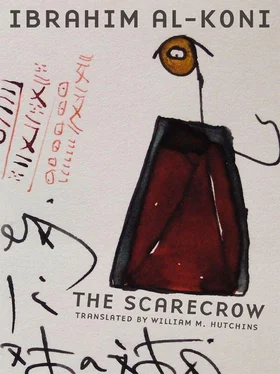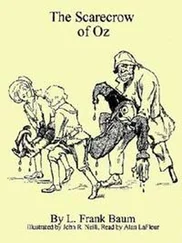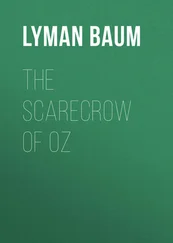The cunning strategist rubbed his hands together gloatingly and proceeded to send lethal gifts to his victims. He knew that the enigmatic creature generations have referred to as “woman” could fend off every adversity, conquer every obstacle, and abstain from every treat, but could not refuse a single gift fashioned from this base metal. If not for gold, woman would never have succumbed to men’s depravities and would never have become a sacrificial offering in the snares of revenge. At the very time that the oasis’s longtime herald — who was a man of such diminutive stature citizens compared him to a rooster — rushed around to warn people against accepting suspicious presents or introducing toxic substances into their dwellings, the disciple of retribution placed between the lips of a counterherald a subliminal message and paid him to scurry about repeating a call that sounded reasonable: “We are only deceived by what we love. We only die of what we desire.”
3
Shortly after the scarecrow’s master took control of the oasis, he ordered the construction of a governor’s mansion on the height beside the temple in the northeastern suburb. The annihilation of women had scarcely commenced when the contractors finished their work. Then this glorious mansion, which was circular and encircled by a wall that was also round, gleamed white on the hilltop like one of those jinni fortresses discussed in the epics of the first peoples. For this reason, rubbernecks, riffraff, and rumormongers dubbed it “The Sorcerer’s House” even before construction workers finished the building and coated it with the lime stucco that lent it the mysterious quality that enchanted everyone who saw it.
The leader (or the sorcerer, as rumormongers liked to call him) settled into his new castle at the same time that bedlam peaked and houses were depleted of housewives. The only sound to be heard from dwellings was the wail of orphaned offspring. Men wandered aimlessly in the alleys, plazas, and markets — oblivious to their surroundings — like madmen or idiots. The oasis was on the brink of destruction, and its men sensed a lethal void. They were afflicted by maladies attributable to the absence of women. Many noblemen died as a result of this disaster. Finally people were obliged to voice what they had only been averring secretly. They denounced the leader as a sinister creature whose era had brought the oasis no good. Instead, calamities had swooped down on its head since the first day he was chosen. They reminded each other of the slaughter of nobles, using language that included suspicious allusions and intimations.
The governor, though, like any head of state, was conscious from day one that citizens were secretly cursing him (because these fools did not realize that cursing never escapes the governor’s attention even when secret, even when not uttered, even if it is merely a thought in a person’s mind). What, then, if this name-calling were a statement launched by a tongue and heard by another creature that was keen to consume it? He had, however, not paid any attention to this, because he was sure that people would inevitably curse someone, and that if they could not find any other target, they would curse their governor. If people feared a governor’s tyranny, they would curse the Spirit World that had installed this governor.
The sorcerer’s knowledge of people’s innate nature led him to ignore what was said — and indeed to disparage everything spouted by commoners — but certainly also caused him to be extremely wary once the agitation increased, the chaos became pronounced, and people dared to curse their head of state in the streets, because this was another sign that could lead to anarchy, insurrection, or some other form of recklessness that could threaten the lives of the people, if the governor did not pay attention and did not counter this danger with an appropriate plan.
In these circumstances, it was necessary for a figure who had agreed to govern people to intervene decisively — not to humor people but to shield them from their own savagery.
4
The leader met with the vassals, who had replaced the Council of Sages as his advisers after the sages had been eliminated. The chief vassal said, “Yesterday, master, the first victims of the emptying of the oasis of women fell dead.”
He was reclining on a chaise longue that artisans had crafted from palm planks and upholstered with padded strips of leather. He was gazing at the emptiness of the naked sky, which was still, nonchalant, and generously washed by a flood of twilight rays. He was lost in space for a long time. Then he asked carelessly, without ending his celestial romp, “To which victims does the chief vassal refer?”
“The rivalry of two suitors for a girl who had not yet turned fourteen; one struck his rival a fatal blow with a dagger.”
The wily strategist’s eyes gleamed with sarcasm, but he did not return from his jaunt in the gilded, blue void. He asked dismissively, “Have men begun to understand what it means for man to lose woman — to live in a settlement without any females?”
“The elders of the oasis agree, master, that the absence of women from the fatherland is an enormous evil, even though they would not deny that their presence may also constitute an even greater evil.”
“Do they finally realize that woman is a tribulation, no matter the circumstances?”
“The truth is that the intellectuals aren’t embarrassed to state bluntly that the desert will never be a true desert till the day it loses all its women.”
He taunted the group sarcastically: “Now oasis citizens find themselves living in the desert while the wasteland tribes live comfortably in the shade of the oasis, because they did not lose their quota of women during their migrations.”
Sorrow gleamed in Abanaban’s eyes, which were washed by the heavenly spring of tears. “My master is right. We are wretches now. No community in the desert, master, is more wretched!”
The leader turned toward him, although his eyes remained locked on the grim void. “Did the chief vassal lose his wife as well?”
The distress in Abanaban’s eyes became even more pronounced. He buried his head in his arms and replied in a murmur like a whisper, “Did my master think my wife could escape a trap that has been the destiny of all the women?”
The sorcerer sat up straight and directed his eyes ever higher until the bodyguards feared their master might fall over backward. He subsided into his prayer, as if searching the stern, eternal void for a sign — as if pursuing prophecy’s star that appears only as afternoon ends, as if hunting for an allusion that the crowd of ignoramuses gathered around him had ignored. This symbol had selected him from the crowd the way inspiration chooses advocates of purity. In his wily eye, deep-seated irony evolved into true malice, because anyone who responds to the Spirit World’s sign inevitably dandles some enigma in his eye.
He volunteered nonchalantly, “I am dying of curiosity to know what people are plotting. I will give a female camel to anyone who tells me what men, whose bedchambers the Spirit World has robbed of women, are plotting.”
He released a muffled, murky laugh that reminded the group of that ignoble, mysterious, ugly laugh they commonly heard from the scarecrow in the fields.
The chief vassal covered his eyes with his veil. Then Asen’fru, the tax collector, responded, “Your men are plotting nothing but despair, master.”
“I will never think it credible that a man who discovers he is alone in bed at night, without a woman, can close his eyes before he has plotted some treacherous scheme to reclaim his lost treasure.”
Asen’fru replied with despair that channeled the people’s despair: “That would be futile, master. I fear that those my master refers to as men have been changed by the calamity into dull-witted wraiths who wander the earth like imbeciles.”
Читать дальше












